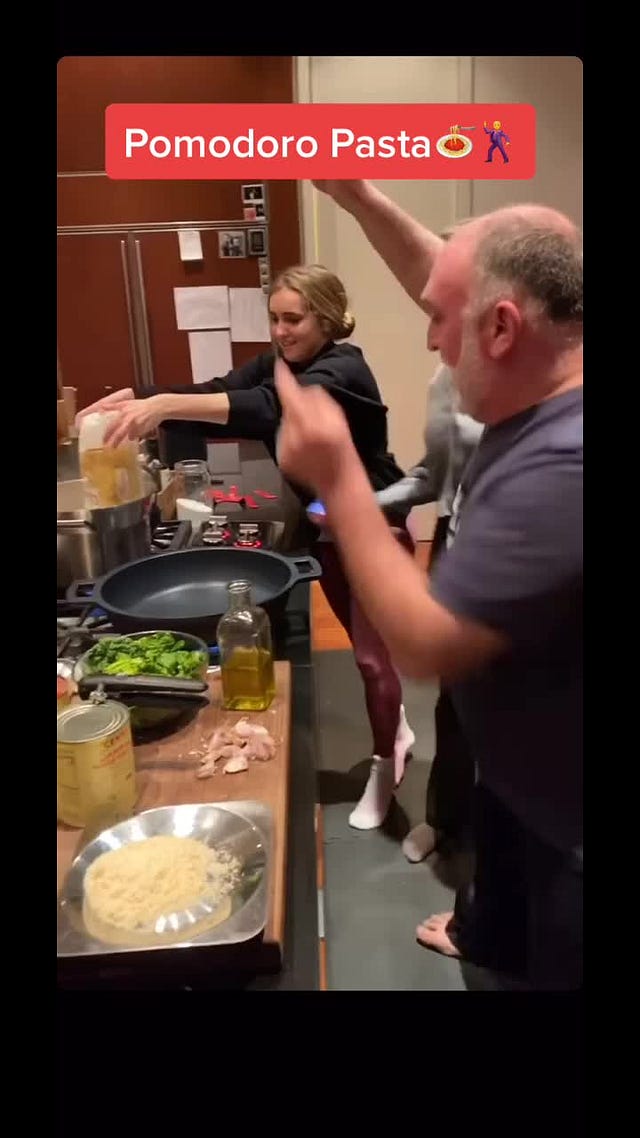Why aren’t we teaching more kids to cook in schools?
It’s a way to fix so many problems facing our children today.
It’s the time of year when our kids are heading back to school, which always has me thinking about our young ones.
So many children in this country are suffering from hunger as well as poor nutrition, which is leading to big health problems … cardiovascular disease, high blood pressure, type 2 diabetes, obesity, and cancer. I am not a doctor or a policy maker, but the National Institutes of Health say that by 2030, nearly 1 in 2 adults in the United States will be obese, and nearly 1 in 4 will be severely obese. This is scary! But as I have said before, food is not the problem…it is the answer!
You know I’ve written a lot about the need for us to make Universal Free School Meals and the importance of making school lunches for kids with more local food and less processed foods in cafeterias, like what my friend Dan Giusti is doing.
But today I want to talk about something else that needs to change about schools and food. This is a topic very close to my heart: cooking. Yes, cooking! Those cooking classes they used to call Home Economics here in the US, well, we need to bring them back. Why? Not because I want everyone to be a chef! It’s because these classes—from first grade through high school—can change kids’ lives. Here’s how.
First, because cooking is such an important life skill, right? It means you will always be able to make a meal for yourself and for the people you love. And it’s a great thing for young people to have a feeling of confidence!
Culinary education, especially when introduced at a young age, also makes kids healthier! Think about this my friends: When you are a kid and you’re asked (or told) to eat your vegetables, have more fruits, don’t eat that junk food, what do you think kids will do? They will say: No way José! You can’t change the way kids think about food by telling them to eat a different way, you have to give them an experience that makes them want to change, by cooking fresh produce for themselves and discovering ways that they like to eat them.
And when kids are cooking in school, it can give their parents a great way to bond, to have a fun activity to do together that you can share: thinking of the recipe, preparing it, sharing it, and even cleaning up. It’s a skill that helps teach collaboration and improves creativity. You see a basket of tomatoes and eggplant and some rice, what will you do? Together you can figure that out!
So, if we want to make them more excited to have some gazpacho, or a bowl of strawberries (peeled or unpeeled!), we have to teach them about these foods – where they come from, how they are grown, and how to make them into a meal. That’s how they will change the choices they make about the foods they eat and they will get excited to actually go to the farmers markets and pick out the foods that are in season and cook with you at home!
It’s not just me saying this, it’s also the smart people at the Centers for Disease Control who have found that these classes help children make healthy food choices which helps to prevent obesity and to reduce all sorts of those health-related issues I was mentioning earlier. And when kids make healthier food choices it’s not just their health that improves, their academic performance improves. It’s all connected!
I want to also mention that these classes make financial sense. If we invest in them now, we are going to save money down the road: Research studies show that nutrition and culinary education programs can save thousands of dollars per year in health-related costs from obesity prevention!
The last thing I’ll say about teaching cooking is this: it is also a much more fun and interactive way to teach everything else a kid needs to learn: history, math, science, reading and writing, too. Especially for kids who are not “traditional” learners, these classes can be a way for many children to feel good about themselves and find some academic success.
With all these benefits from cooking classes, we should start young and keep it up through high school to set young people up for a career in the culinary arts, you know, doing what my team and I do! Culinary school can be out of reach financially for many families, making becoming a chef seem like an impossible career path, but if we have strong culinary programs in high school, we can create a generation of young people that is is ready to have a career in the restaurant industry, with lots of upward mobility, financial security, and success.
So if cooking classes do so much good, why is it that in the US students receive less than 8 hours of required nutrition education each school year! Why aren’t we making this curriculum change now? Well, in 2021, Senators Cory Booker (D-N.J.)—who you might remember was on my podcast!—and John Cornyn (R-Texas) introduced the Food and Nutrition Education in Schools Act, a bipartisan bill that would fund food education programs in schools…but unfortunately this bill died after being introduced. I am hoping that legislators in states across the country will start to see hands-on culinary education as an important part of every grade’s curriculum. If you agree, write to your elected and tell them this is important to you and to our kids! But until Congress acts, you can try to change things in your own school.
There are many organizations across the country bringing food education and cooking classes into classrooms. Many of these programs are free and run by nonprofits all over the country like FoodPrints here in DC, the Beechers Foundation, Spoons Across America, and Wellness in the Schools. They can come to your school and start working with your kids!
Check it out and see if they have time to fit your school in this year. And if you have worked with a nonprofit that does amazing cooking classes in schools, share with our community here.
Thank you, my friends!






As a 14 year old student in school in England I was required to attend working classes in “Domestic Science" for one year whilst the girls were required to take metalwork and woodwork for a year.
Yes! Yes! Yes! As a primary care physician with a focus on prevention I believe to truly address the chronic disease epidemic and promote health rather than focus on sickness we would be well served to help empower people with the knowledge and skills to be their own steward of health. From current food systems that flood the market with cheap ultra-processed foods creating food swamps and illness to the lack of nutrition, let alone culinary education in schools, creates a system of poor health that becomes difficult to overcome even with best efforts. (and then we exclusively blame the patient for obesity, diabetes or chronic pain) Add to that, medical schools also only provide an average of 24 hours of nutrition education even though physicians go to med school and residency for a minimum of 7 years!!! How can we expect to be a healthy nation when our health care providers don't know how to help patients apply nutrition principles to every day life such as how to choose foods and cook them? And, by the time patients enter our 'sick care system' (because our focus on treating sick people rather than helping people maintain health) they already have illness and habits that are difficult to change. Agree 100%, if we put this focus on healthy food and skills to prepare it in elementary school, our children would grow up with the nourishment to not only help them excel in school but also develop the healthy eating habits and skillset to maintain health as they become adults. Fortunately, we are gaining momentum thanks to the voices of people outside of healthcare like great Chefs such as Jose Andres and even congress working together like Senators Booker and Cornyn along with medical schools such as Touro College Osteopathic Medicine in Ca, that are implementing Culinary Medicine Programs like the Health Meets Food curriculum developed by Tim Harlan, MD, now at George Washington U., also where, with Jose Andres, they just opened the global Food Institute ( https://culinarymedicine.org/ and https://globalfoodinstitute.gwu.edu/) Or, the ever-expanding multi-professional Teaching Kitchen Collaborative led by David Eisenberg, MD at Harvard (https://teachingkitchens.org/). And incredible projects such as "Recipe4Health" championed by Dr. Steven Chen in Alameda County, Ca (https://recipe4health.acgov.org/). For the first time in 50 years even our federal govt. has begun to reassess the importance of nutrition! (https://www.whitehouse.gov/briefing-room/statements-releases/2023/03/24/fact-sheet-biden-harris-administration-launches-the-white-house-challenge-to-end-hunger-and-build-healthy-communities-announces-new-public-private-sector-actions-to-continue-momentum-from-hist/). I bring these examples (and there are many more 'sprouting' up every day!) not to advertise or brag, but bring excitement, hope and ideally momentum to these initiatives to address these issues. It's amazing to me that it takes a Chef to get the actual health profession to think about nutrition....but that might just be one of the secret ingredients we need. Thank You, Chef Andres, for speaking about this very important issue!